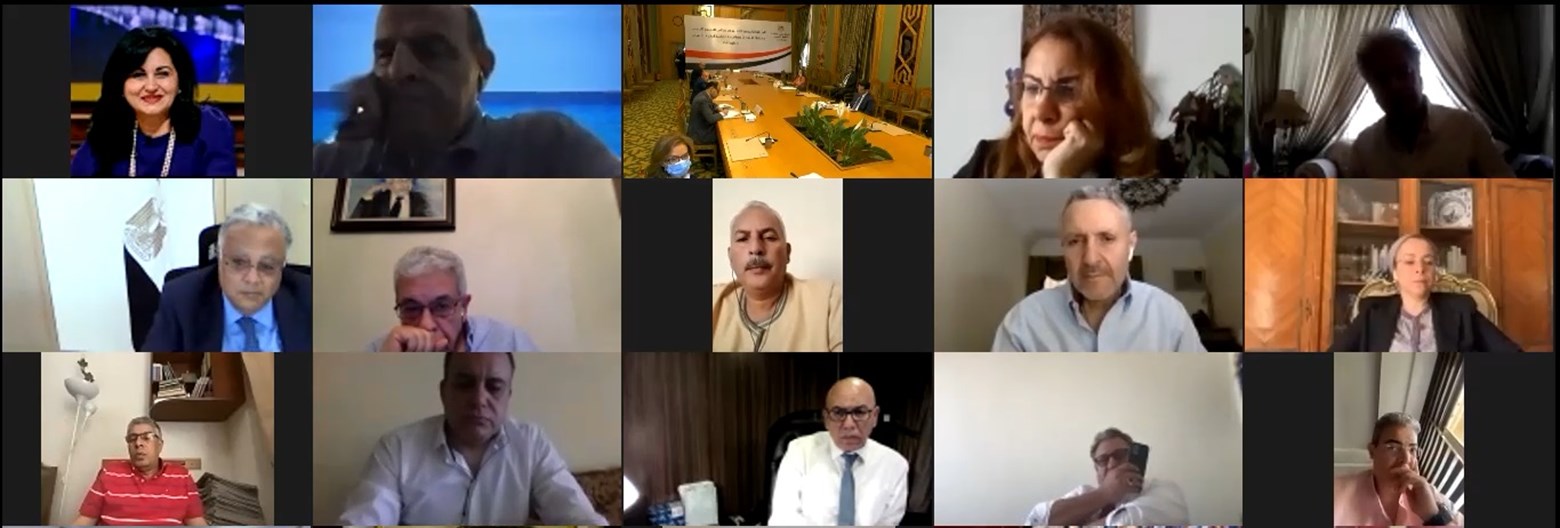Meeting of the Technical Secretariat of the Supreme Standing Committee for Human Rights with Representatives of Civil Society Within the Framework of Preparing the National Human Rights Strategy

Within the framework of the broad consultative approach, consistent with State approach, pursued by the Supreme Standing Committee for Human Rights in the process of preparing the first national strategy for human rights, the Technical Secretariat of the Supreme Committee held a meeting on Saturday 8 May. with a number of civil society representatives and public figures; with the participation of Ambassador Dr. Ahmed Ihab Gamal El-Din, Egypt's Permanent Representative to the United Nations in Geneva. Ambassador Alaa Rushdie, Assistant Minister of Foreign Affairs and Acting Head of the Technical Secretariat of the Supreme Standing Committee for Human Rights, affirmed that the Supreme Committee considers civil society organizations as essential partners in the process of promoting and protecting human rights; and therefore, the Committee is keen to enhance communication, coordination, and consultation with them. During the meeting, a review of the most prominent features of the draft strategy and its targeted results, followed by a constructive and open dialogue about the comments and suggestions of the participants. Participants of the meeting session commended State’s initiative to prepare the Strategy and the Supreme Committee’s openness to listening to various opinions and suggestions within the framework of its preparation. Participants discussed and reflected upon the most prominent issues and challenges related to the promotion of human rights and their vision regarding optimal dealing with human rights. Ambassador Alaa Rushdie affirmed the Strategy is the beginning of a new phase of strategic planning in the field of promoting human rights; he also affirmed that some issues require continued discussion and identification of the best means to deal with them, and that is through the continuance of constructive dialogue with concerned parties, including civil society.
It should be noted that this meeting comes within the framework of the second phase of consultation regarding the Strategy. In the first phase of consultation, the Technical Secretariat of the Supreme Committee held six hearings, in December 2020 and January 2021, which included representatives of the National Council for Human Rights, nongovernmental organizations and institutions, professional and labor unions, research centers and universities, federations of chambers of commerce, businessmen associations, public figures and intellectuals. The Supreme Committee took into consideration, while drafting the draft strategy, many proposals regarding the various elements of Strategy's work. In addition, the Committee formed an "advisory body" comprising 25 public figures and experts specialized in law, economics, public policy, and strategic planning, with the aim of benefiting from various experiences in the process of preparing the Strategy.
Assistant Minister of Foreign Affairs Ambassador Alaa Rushdie explained that the Strategy adopts a comprehensive and serious approach to promoting fundamental rights and freedoms; the approach is characterized by a clear vision and strategic orientation in planning. The Ambassador stated that the Strategy is an ambitious national roadmap in the field of human rights and an important tool for self-development in this field. The initiative to prepare the Strategy also reflects the existence of a firm political will to give impetus to the relevant national efforts. Ambassador Alaa Rushdie added that the time frame for the Strategy’s implementation extends for a period of five years (from mid-2021 to mid-2026), and that it includes four main axes of action that complement each other; namely: civil and political rights; economic, social, and cultural rights; human rights for women, children, and people with disabilities, youth, and the elderly; and education and capacity building in the field of human rights. The Strategy defines in each axis the main strengths, opportunities, and related challenges, in order to define the targeted results that aim to achieve progress in three parallel and complementary tracks: the legislative development track, the institutional development track, and the human rights education and capacity building track.
It should be noted that the Supreme Standing Committee for Human Rights headed by the Minister of Foreign Affairs - established in 2018 by decision of the Prime Minister, with the aim of developing and following up the implementation of an integrated approach to promoting respect and protection of human rights - has taken over the leadership of the preparation process for the Strategy, which began in 2020. The Committee enumerated future plans, programs and activities related to human rights in coordination with all ministries and concerned parties; while studying national action plans and strategies already adopted in various fields to achieve their cohesion with the Strategy. This can be achieved through building on the objectives, programs and activities of these action plans and strategies with the aim of achieving cohesion from a comprehensive human rights perspective. During the preparatory phase, the Supreme Committee was keen to study the national human rights strategies and action plans of a number of countries, with the aim of identifying best practices and relevant experiences. The Committee also enumerated, classified, and studied the final recommendations Egypt received from international and regional human rights mechanisms, as well as the recommendations of the National Council for Human Rights, and the status of their implementation, in coordination with all ministries and relevant authorities.